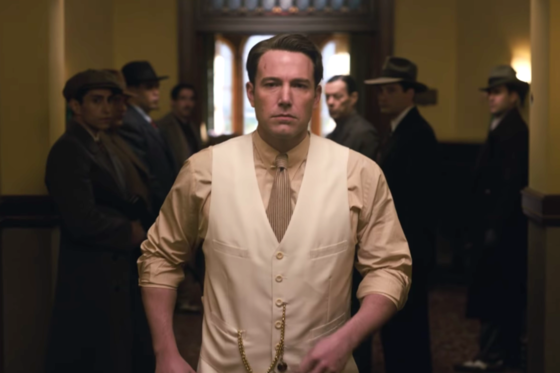
In the last few months of each year, studios frantically campaign for their slate of films to be considered for the end of the year awards ceremonies. While some of these efforts find success and end up appearing at the Academy Awards, many don’t make the cut for a variety of reasons, including poor critical reception, box office underperformance, or controversy. Many of the films that seem to rank high in early awards predictions fade from memory, and have become forgotten in the wake of their failure to earn any golden statues.
However, just because a film doesn’t become an awards success doesn’t mean it has no value, and some films written off as “failed Oscar bait” are actually much better than their reputation suggests, and deserve to gain new critical appreciation. Here are ten failed Oscar bait films that are actually good.
10. Rosewater

While Jon Stewart was a first time film director when he directed Rosewater, he had never been a stranger to award shows, having won a staggering 22 Emmy Awards and serving twice as an Oscar host. Stewart’s first film gained strong reviews out of the Telluride and Toronto film festivals, but by the time Oscar season had gone into full swing, his film was no longer a topic of conversation.
The lack of recognition is unfortunate, as Rosewater is an impressive debut by a filmmaker who clearly has something to say. Based on a true story, the film follows London journalist Maziar Bahari’s 118 days in an Iranian prison after being falsely accused of espionage after filming a comedy sketch with Stewart’s The Daily Show. Stewart’s wry sense of humor and ability to find the comedy within the absurdity of true events translates well in the film, and Gael Garcia Bernal’s excellent performance as Bahari reflects that sensibility.
Stewart also wrote the screenplay for the film, and the dialogue is filled with smart, snappy interactions that combine pop culture references with a more serious discussion of the role of journalistic integrity within oppressive regimes. Primarily set in the prison where Bahari was detained, Rosewater is an excellent chamber piece that explores the complexity of the situation.
9. A Most Violent Year

Generally, the film named Best Film of the Year by the National Board of Review is considered to be a top tier Oscar contender, but 2014’s winner A Most Violent Year became the first film to win that award since 2000’s Quills to not go on to be a Best Picture nominee. In fact, J.C. Chandor’s crime epic was shut out altogether from the Oscars, despite Jessica Chastain earning many accolades for her performance, including a Golden Globe nomination for Best Supporting Actress.
Oscar Isaac stars as Abel Morales, a small time business owner that faces a moral crisis when his trucks begin to get hijacked. Abel’s wife Anna, played by Jessica Chastain, encourages him to be more radical in confronting his enemies, which puts both their business and marriage in crisis.
Like J.C. Chandor’s previous two films Margin Call and All is Lost, A Most Violent Year is a slow burn, revolving around a city’s descent into chaos and the dissolution of a marriage. The brilliance of Chandor’s approach is that the central relationship adds gravity to what could be confusing material; the nuance of how business is corrupted by criminal investors could be hard to follow, but the emotion of the situation comes across in the performances from Isaac and Chastain.
In addition to the terrific lead roles, A Most Violent Year also deserved recognition for the atmospheric score from Chandor’s frequent collaborator Alex Ebert. There’s also a great ensemble cast that includes David Oyelowo as an Assistant District Attorney and Albert Brooks as Abel’s lawyer, both of whom put more pressure on Abel as his world collapses.
8. Live by Night

Coming off of a Best Picture win for Argo, Ben Affleck’s popularity seemed to be at an all-time high, but his follow up film Live by Night ended up being a financial disaster for Warner Bros. and drove Oscar voters far away. Affleck’s old school gangster epic failed to connect with viewers and never achieved the acclaim that his first three films had earned.
The film sees Affleck as Joe Coughlin, a veteran turned bank robber that flees from Boston to Florida after he is brutally beaten by members of the Irish mafia. As he seeks revenge, Joe attempts to establish his own legacy by creating a casino in the Prohibition era, but is threatened by the mafia, the cops, and the Klu Klux Klan.
One of Affleck’s best assets as a filmmaker is his ability to turn environments into characters, and Live by Night does a great job at making each environment unique and memorable, with the film’s ending in Miami boasting some truly emotional moments. Affleck also knows how to create memorable action, including shootouts and bank heists that perfectly represent the pulp inspirations for a 1920s gangster flick.
Affleck is also keen to make Joe a dynamic leading man, whose ego and foolishness put him at odds with a revolving group of enemies and ultimately prevent him from enjoying any sort of normal life. The fleeting moments of happiness for Joe come in his relationship with Zoe Saldanda’s character Graciela; while their scenes together are limited, Affleck and Saldana give sensitive, powerful performances that certainly deserve more attention.
7. Black Mass

Initially seen as a comeback for role for Johnny Depp, Black Mass saw Depp forgetting the over the top costumes and wacky persona that had plagued his recent career, and instead had him taking on a serious biopic role as mobster turned FBI informant Whitey Bulger. While Depp’s performance was heralded, his terrifying role didn’t end up earning him a spot at the Dolby Theater.
Depp’s performance is about as different from his other recent performances as it could be, as Bulger is a menacing presence who is able to turn even casual conversations into tense standoffs. As the film chronicles Bulger’s hesitant involvement with the FBI, his fear of being a known “rat” shows that in his business, reputation is prized above everything else.
Also great in the film is Joel Edgerton as John Connolly, the FBI agent who recruits Bulger. While Connolly is initially a sympathetic character in that he wants to use Bulger to take out other dangerous gangsters, his morality becomes more grey as he begins to absolve Bulger of his crimes and become part of the business he swore to destroy.
Black Mass features a great screenplay by Jez Butterworth and Mark Mallouk, and explores the importance of family and trust within a mob organization; despite Bulger’s long monologues about the importance of integrity, his FBI involvement betrays those who worked alongside him. The themes and gritty tone make Black Mass a sorely underseen gem that was unjustly ignored by the Academy.
6. Youth

While Youth did recieve one Oscar nomination for Best Original Song for “Simple Song #3,” it was largely considered to have been an underachievement considering the high profile campaign from Fox Searchlight, which was centered around awarding two time Oscar winner Michael Caine with a Best Actor trophy. There was also strong buzz for Harvey Keitel, but neither ended up earning an Oscar nomination for their work.
Caine stars as legendary composer Fred Ballinger, who takes an extended stay at a hotel in the Swiss Alps alongside his best friend Mick Boyle, a filmmaker played by Keitel. Over the course of their stay, Fred and Mick get the chance to look back at the entirety of their lives and reconcile with their decisions. Fred tries to reconnect with his adult daughter, played by Rachel Weisz, as he prepares to perform one of his most famous songs for the British royal family.
It’s perhaps unsurprising that the film failed to capture Academy voters; while it may have the premise for a standard drama, Youth is filled with surrealist imagery, often assaulting the senses with vivid nightmares, graphic sexuality, and shocking plot developments. The depiction of the end of life is uncompromising, and doesn’t shy away from questioning how even the most successful people may feel unsatisfied. Caine and Keitel are both incredibly compelling onscreen in performances that allow them to reflect on their own legacy as actors.